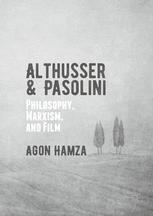

Most ebook files are in PDF format, so you can easily read them using various software such as Foxit Reader or directly on the Google Chrome browser.
Some ebook files are released by publishers in other formats such as .awz, .mobi, .epub, .fb2, etc. You may need to install specific software to read these formats on mobile/PC, such as Calibre.
Please read the tutorial at this link: https://ebookbell.com/faq
We offer FREE conversion to the popular formats you request; however, this may take some time. Therefore, right after payment, please email us, and we will try to provide the service as quickly as possible.
For some exceptional file formats or broken links (if any), please refrain from opening any disputes. Instead, email us first, and we will try to assist within a maximum of 6 hours.
EbookBell Team

4.8
54 reviewsAgon Hamza offers an in-depth analysis of the main thesis of Louis Althusser’s philosophical enterprise alongside a clear, engaging dissection of Pier Paolo Pasolini’s most important films. There is a philosophical, religious, and political relationship between Althusser’s philosophy and Pier Paolo Pasolini’s films. Hamza teases out the points of contact, placing specific focus on critiques of ideology, religion, ideological state apparatuses, and the class struggle. The discussion, however, does not address Althusser and Pasolini alone. Hamza also draws on Spinoza, Hegel, Marx, and Žižek to complete his study. Pasolini’s films are a treasure-trove of Althusserian thought, and Hamza ably employs Althusserian terms in his reading of the films. Althusser and Pasolini provides a creative reconstruction of Althusserian philosophy, as well as a novel examination of Pasolini’s film from the perspective of the filmmaker’s own thought and Althusser’s theses.